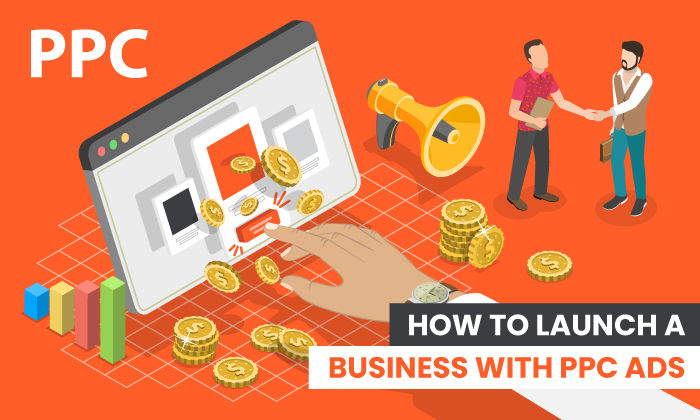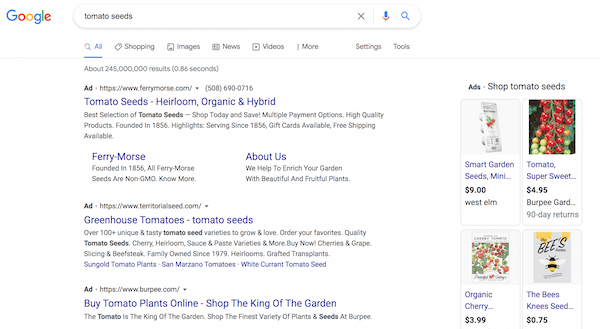
You came up with an idea, did your research, maybe even found some funding. You are ready to launch a business — but how do you get people to your website or store?
Pay-per-click (PPC) ads are one of the most effective ways to drive growth for your new business. Unlike brand building, content marketing, and social media, PPC ads can drive traffic today. There’s no need to wait weeks or months for your efforts to pay off.
Even if you have years of business experience behind you and are pretty well-versed in marketing, PPC ads for a new business need to be handled differently. Below, you can learn more about why PPC ads may be the way to go for your business and find tips for to make the most of them.
Why Should You Launch a Business With PPC Ads?
PPC ads can be a great way to launch a business because they allow you to reach your specific target market through keywords and target demographics.
With PPC ads, you create an ad and pay only when someone clicks on it. The ad should do something to draw the audience’s eye and make them want to click.
This type of ad is for new businesses for a variety of reasons, not the least of which is since they’re paid, you don’t have to wait to get to the top of search engine results organically. They show up at the top of the list automatically.
Some other reasons include:
Reach Only Your Target Audience
PPC ads are highly targeted. When creating a PPC ad, you get to enter a ton of details about who you want to see the ad. The ad is then shown to people who fit that description. For example, you can target people based on their location, age, income, likes, family status, and even what shows they like.
Budget-Friendly
While the platform requirements vary, you can set a budget limit upfront with PPC ads. You know the absolute max you’ll spend on an ad campaign when you start, then you can track the success of your PPC ad and make alterations for future ones.
This also makes it easy to scale; when you a ready for more traffic, just up your budget.
Trackability
Because PPC ads are based on each click or interaction with the ad, you can follow how people respond. If an ad isn’t getting the responses you want—though remember, Rome wasn’t built in a day—you can alter the way the ad looks and see if that works better.
Being able to track the ROI of your ads directly makes it easier to pivot if things aren’t going well — or spend more money when they are.
How Are PPC Ad Campaigns for Launching a Business Different From PPC Ad Campaigns for Existing Businesses?
Existing businesses have name recognition working in their favor, while new companies don’t. So, your PPC ads need to work a bit differently. While both types involve keyword research and target audiences, your research and focus on both factors need to be more intensive.
Keywords and PPC Ads for New Businesses
You need to use keywords specific to your brand and products in your PPC ads. Businesses that have been around for a while already know what keywords drive their traffic; you need to do a lot more digging as a new business owner.
Start with a keyword research tool. Search for words relating to your brand, determine which combinations seem to drive the most traffic for other brands, and tailor them for your needs.
Once you’ve chosen your keywords, make sure they’re in your copy so potential customers know exactly what it is you’re selling, why they should choose you, and call them to action.
Here’s an example. When we search for tomato seeds, we get a selection of ads from various sellers:

The ones that stand out showcase the tomato seeds keywords, as well as related keywords such as heirloom and organic. Unless a user searched for a specific brand, they’re likely to be drawn in by your keywords and not your brand name.
Target Audiences and New Business PPC Ads
Your target audience is the group you want to see your ads. You can define them by location, age, gender, income, and more. Again, this is about being as specific as possible, figuring out who you want to buy your product via intensive research.
Your potential customers are more than just data, though. They like specific things. When you launch your first campaign, you should find out what types of ads they’re most likely to click on and create ads lining up with those details. You also need to find out where they’re most likely to click on them. Are they on Google or social media?
If they’re on social media, use strong visuals to stand out. As a bonus, you can often have a bit more copy with social media PPC ads than with search engine PPC ads. To grab their attention, use your picture and content to make it clear your new business meets your audience’s needs.
Let’s take TapRm. When you see this ad, specially targeted for those who live in NYC, you know immediately what they are all about. The various selling points, such as same-day delivery, may entice you to click and learn more.

5 Tips for Launching a Business With a PPC Ad Campaign
Are you ready to dive into PPC ads to launch your business? Here are some actionable steps.
1. Get Really Focused
One way to ensure you’re getting the most out of your PPC ads is to zone in on exactly who you are targeting and what you want them to do right now. Don’t get distracted by possibilities down the line.
Stay focused on the market your business is best designed for and limit your reach to the most qualified buyers. These early days are the time to build buzz among your most potentially loyal customers, who will fall in love with your business.
2. Decide Where Your Audience Should Go
Your audience likely found you because they searched for a resolution to a specific problem, so avoid the temptation to send them to your homepage.
Instead, think through exactly where you want them to go when they click your ad. Maybe it’s a product page, sign-up page, or landing page created just for this campaign. Since customers are likely new to your website, you want to keep the conversion journey short and straightforward.
3. Start Small
You could create a wide range of PPC ads when you launch a business, focusing on different aspects of your business and showing up in various online spaces. But in these early days, keep it simple. Choose one of the platforms where your target audience is likely to be, either on social media or search engines, and focus on solving specific problems your customers have.
Keeping things this focused at first can help you figure out what types of ads people click on to find your site and whether or not they convert. Later, you can use this information to expand your types of PPC ads.
4. Analyze the Data
Once you launch your PPC campaign, keep an eye on how your ads perform. Luckily, most paid platforms track this data automatically, making it relatively easy to see how many people see the ads versus how many click.
Are people seeing the ads but not clicking? Maybe you aren’t speaking to your customers’ needs.
Are people clicking but not converting? Maybe you’re sending them to a page that doesn’t immediately solve their problem.
Keep watching the ads, figure out when and how people are converting, and change tactics accordingly.
5. Build on What’s Working
As you continue your PPC efforts, create campaigns using campaign strategies that worked in the past, making them better each time. If you had a copy-only ad at first, you could take that copy and use it to create a PPC ad with a photo or video, for instance.
Measuring the Success of Your PPC Campaign When You Launch a Business
Watching your PPC campaign’s metrics can provide the feedback you need so you can create paid ads that actually convert.
The metrics you should pay attention to include:
Impressions
These tell you how many people see your ads. Knowing how many people see the ad lets you know if your audience is too broad or narrow, particularly when compared to the number who click.
Click-Through Rates
Click-through rates show you how well your ad design and copy are performing. If people are clicking through, you’ve made a good first step.
Conversion Rates
Once you notice those click-throughs, you’ll need to watch for conversion. Are people buying, signing up, or other actions? If not, find out why and change accordingly.
Social Interactions
If your ads are on social media, look for interactions such as likes or shares. With your new business, these metrics may not be about conversions but to show some growth in brand awareness.
When you launch a business, you’re bound to try things that aren’t going to work. Don’t be afraid to scrap an idea and start fresh. Success in PPC ads involves trial and error until you connect with your ideal target market with a message they respond to.
Conclusion
You’ve launched your big idea. As a struggling startup, what’s next?
It’s time to get out there and start advertising. PPC ads can help you narrow down your focus, provide valuable feedback about how customers respond to your new business, and help you understand how to meet their needs.
What kind of PPC ads are you going to use for your next business venture?
via https://AiUpNow.com May 6, 2021 at 03:42PM by Neil Patel, Khareem Sudlow,
